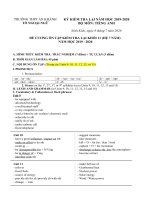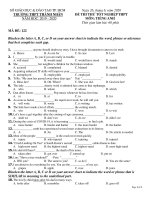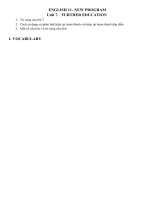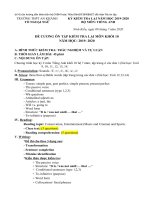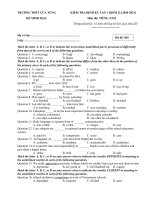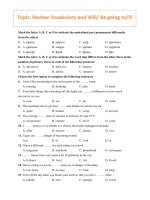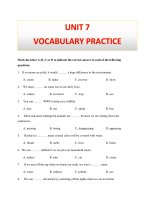- Trang chủ >>
- Luật >>
- Luật thương mại
thi thu hay
Bạn đang xem bản rút gọn của tài liệu. Xem và tải ngay bản đầy đủ của tài liệu tại đây (152.38 KB, 6 trang )
<span class='text_page_counter'>(1)</span><div class='page_container' data-page=1>
Trang 1/6 - Mã ñề thi 209
TRƯỜNG THPT HUỲNH THÚC KHÁNG
ðỀ CHÍNH THỨC
ðỀ THI THỬ TUYỂN SINH ðẠI HỌC NĂM 2012
Môn thi: Tiếng Anh
Thời gian làm bài: 90 phút;
(80 câu trắc nghiệm)
Mă ñề thi 209
Họ, tên thí sinh: ...
SBD: ...
Mark the letter A, B, C, or D to indicate the correct answer to each of the following questions
Question 1: In the _______ chart, Capricorn brings ambition and a constructive drive to planets or Houses therein.
A. star B. zodiac C. astrology D. horoscope
Question 2: Write down the numbers in order of ______, beginning with the smallest.
A. variables B. magnitude C. tally D. continuous
Question 3: It's good to have someone to ______ for help and advice in time of trouble.
A. look in B. look on C. look to D. look up
Question 4: Which of the following sentences is CORRECT ?
A. The colleges hired extra security for the football game.
B. The colleges were hired by extra security for the football game.
C. Extra security were hired by the colleges for the football game.
D. Extra security was hired by the colleges for the football game.
Question 5: She _______ out of the house as fast as her legs would carry her.
A. dashed B. ambled C. strolled D. plunged
Question 6: Choose the item that is CLOSEST in meaning to the underlined word in the sentence
Unwillingly, the boss agreed with the demands of the workers regarding the pay-rise.
A. Frantically B. Eventually C. Nervously D. Reluctantly
Question 7: The ____ violinist has been amazing audiences since she was thirteen years old.
A. recluse B. virtuoso C. discrete D. tycoon
Question 8: It's _____ she likes him. Have you seen the way she looks at him when he walks through the cafeteria?
A. plain as day B. hold the fort C. cheesed off D. smell a rat
Question 9: The more expensive carpet is a good choice ______ it will last longer.
A. due to B. in view of C. in that D. be means of
Question 10: There would seem a ______ chance that the United States, working with the United Nations, will lead a
worldwide religious revival.
A. scarce B. averse C. harsh D. faint
Question 11: I don't know how I'm going to get _____. Everything is so expensive here.
A. over B. up C. by D. away
Question 12: The two teams are ______ equal. It's difficult to predict who is going to win.
A. roughly B. scabrously C. evenly D. gradually
Question 13: Select the answer (A, B, C or D) which is closest in meaning to expression in italic.
A and B are walking home. A feels that a boy has been following him.
A: “There's a boy who has been following me since yesterday. He hides himself when I turn around to look at him.”
A: “He's up to no good. I'm quite sure about it.”
B: “Don't jump to conclusions. I'll try to speak to him.”
A: “Just tell him off”
A. Just make him tell you his plans B. Just give him a scolding
C. Just ask him what he wants D. Just tell him to go off
Question 14: He ______ more and more experience until he finally reached the top of his profession.
A. earned B. achieved C. got D. gained
Question 15: The boss _____ into a rage and started shouting at Robert to do as he was told.
A. flew B. rushed C. charged D. burst
Question 16: I always sleep ______ when I’m at the seaside. It must be the healthy air.
A. deep B. hard C. soundly D. evenly
Question 17: Shop assistant : Are you going to buy that suit ?
Customer : I don’t have enough money for it.
Shop assistant : _________
Customer : Well, in that case, I’ll take it.
A. We don’t earn much commission here, you know. B. Actually, sir, all suits are 50% off right now.
</div>
<span class='text_page_counter'>(2)</span><div class='page_container' data-page=2>
Question 18: Since none of the pupils would _________ to breaking the window, the teacher kept the whole class
behind for an hour.
A. speak up B. open up C. speak out D. own up
Question 19: The rains which started late in the evening lasted till the _____ hours of Wednesday
A. small B. last C. late D. fall
Question 20: There he was up the ladder with the bucket of water over his head! It was ______!
A. too much of a good thing B. too true
C. too good to be true D. too funny for words
Question 21: Oops, ______. Costa Rica have scored again.
A. that will do B. that’s torn it C. that’s tore up D. that’s tore off
Question 22: Choose the CORRECT RESPONSE:
What did Mr. Schmitt say ? “_______”
A. He telled me not to waste my time there.
B. He explained how do you make coffee the Dutch way.
C. He said the movie was too long.
D. He said he liked house with big windows.
Question 23: A student has done well on a test. Which of the following feedback statements from the teacher would
be best, based on the discussion in your text:
A. "Good work, you are still one of the best students."
B. "Your definitions were very clear."
C. "You're so smart!"
D. "You did so wellhorizontalyou really lucked out."
Question 24: “The Midwest is experiencing its worst drought in 15 years. Corn and soybean prices are expected to be
very high this year.” What does the second sentence do ?
A. It restates the idea found in the first. B. It gives an example.
C. It states an effect. D. It analyzes the statement made in the first
Question 25: It is impossible to predict the ______ of the election as the vote seems split about 50-50.
A. outlay B. outgoings C. outcome D. outlook
Question 26: Standing in the back of the company store, she felt someone ______ at her. For several moments she
tried to ignore the feeling
A. seeing B. staring C. following D. glimpsing
Question 27: Her ________, painted in 1595, now hangs in the Scottish National Portrait Gallery.
A. photo B. portrait C. illustrates D. depicts
Question 38: The company is planning to _______ 50 new staff.
A. appoint B. receive C. import D. recruit
Choose the A, B, C, or D that is OPPOSITE in meaning to the underlined words or phrases in the sentences.
Question 29: The explosion had such a devastating power that it blew the whole building into pieces.
A. constructive B. destroyable C. potential D. avoidable
Question 30: Once you are behind the wheel, driving cautiously is not all that matters, as others may well put you at
risk.
A. conveniently B. carefully C. recklessly D. swiftly
Read the passage and choose A, B, C, or D to indicate the correct answer for each numbered blank.
Too much choice
Society is becoming ‘overchoiced’. There are too many things to do, too many options, too many opportunities.
In the new economy, the desire for the new product, service or next big thing is an addiction, and technology simply
accelerates the (32)_______ of change: the noise, the (33)_______ of new goods and services, offering more and more
choice. No sooner has the new product emerged off this virtual production line than the next one is about to be
(34)________ . The head spins, the brain races, the fatigue (35)________, the disconnection from life begins.
Choice is the mantra of the new economy, but more choice means more stress, less time and more
complexity. Hence a new trend is (36)_______. The search is on for simplexity – the simple things that give meaning in
an increasingly complex world. But simplifying your life is not easy in an age of economic excess. There are more
basic brands of detergent and breakfast cereals than we can ever need or want, more software upgrades, features
and calling plans than we can keep (37)_______ of. Because of this, a wave of new businesses are being built on the
(38)_______ solution: acting as info-mediaries, positioning themselves as tried and trusted friends, getting to know you,
your values, your lifestyle, making choices for you, saving you time, bringing clarity.
</div>
<span class='text_page_counter'>(3)</span><div class='page_container' data-page=3>
Trang 3/6 - Mã ñề thi 209
Question 32: A. movement B. motion C. pace D. step
Question 33: A. proliferation B. augmentation C. extension D. escalation
Question 34: A. instituted B. initiated C. embarked D. launched
Question 35: A. sets up B. sets in C. gives in D. gives up
Question 36: A. abreast B. afoot C. afire D. aground
Question 37: A. hold B. trace C. track D. sight
Question 38: A. complex B. green C. increase D. one-stop
Question 39: A. depend B. match C. catch D. reflect
Question 40: A. our B. their C. in D. its
Question 41: A. basis B. core C. outside D. importance
Mark the letter A, B, C, or D on your answer sheet to indicate the word that differs from the rest in the position of the
main stress in each of the following questions.
Question 42: A. satisfy B. separate C. routine D. satellite
Question 43: A. generational B. disobedient C. argumentative D. communicative
Question 44: A. metallic B. momentum C. medieval D. monastery
Question 45: A. legacy B. temperature C. conspiracy D. literature
Question 46: A. literature B. considerable C. magnificent D. material
Read the following passage and mark the letter A, B, C or D to indicate the correct answer to each of the questions.
Industrial Revolution got under way first in England. This is a historical fact of the utmost significance, for it explains
in large part England’s primary role in world affairs in the nineteenth century. Consequently, the question of why the
Industrial Revolution began where it did is of much more than academic interest.
The problem may be simplified by eliminating those countries that could not, for one reason or another, have
generated the Industrial Revolution. Italy at one time had been an economic leader but had dropped behind with
the Discoveries and the shift of the main trade routes from the Mediterranean to the Atlantic. Spain had been
economically predominant in the sixteenth century but had then lost out to the northwestern states for various
reasons already noted. Holland had enjoyed her Golden Age in the seventeenth century, but she lacked the raw
materials, labor resources, and water power necessary for machine production. The various countries of Central and
Eastern Europe had been little affected by the Commercial Revolution and hence did not develop the technical
skills, the trade markets, and the capital reserves needed for industrialization.
This leaves only France and Britain as possible leaders, and of the two, England had certain advantages that
enabled her to forge far ahead of her rival. In commerce, for example, the two countries were about equal in 1763,
or, if anything, France was somewhat in the lead. But France had a population three times that of England. France
also lost ground in foreign trade when she was driven out of Canada and India in 1763. Furthermore, the blockade of
the British fleet during the Revolutionary and Napoleonic Wars reduced French commerce to about half its 1788
value, and the loss was not restored until 1825.
Another important advantage enjoyed by Britain is that she had taken an early lead in the basic coal and iron
industries. Because the forest reserves were being depleted, Britain early began using coal for fuel and for smelting
iron. By the time of the French Revolution in 1789, Britain was producing about 10 million tons of coal per year, while
France was producing 700,000 tons. A contemporary poet sensed the significance of this unlimited source of power
for English industry when he wrote, “England’s a perfect World! has Indies too! Correct your Maps! New-castle is
Peru.”
England also pioneered in the development of the blast furnace which, in contrast to the old forges, could
mass-produce iron. In 1780 Britain’s iron output had been a third that of France; by 1840, it was three times more. All
this meant that Britain was pushing ahead in the production of goods of mass consumption for which there was a
large and steady demand, whereas France specialized more in luxury commodities of limited and fluctuating
demand. Perhaps Voltaire had this in mind when he wrote in 1735, “In truth we are the whipped cream of Europe”
Question 47: The word forge, as it is used in the third paragraph, means:
A. alter in order to deceive. B. move forward steadily.
C. make use of the blast furnace. D. produce wrought iron.
Question 48: In comparing the economic development of England and France, the passage shows that:
A. England and France were essentially equals until the middle of the nineteenth century.
B. France modeled itself on the examples of Italy and Spain, while England modeled itself on the example of
Holland.
C. England gained most of its capital reserves from the spoils of war, while France gained its capital reserves
from trade.
</div>
<span class='text_page_counter'>(4)</span><div class='page_container' data-page=4>
the middle of the nineteenth century.
Question 49: What reason does the author give for discussing several countries besides England and France?
A. Eliminating countries whose Golden Age was yet to come
B. Enriching the information provided in the passage
C. Simplifying the problem confronted in the passage
D. Balancing the passage in the interest of fairness
Question 50: The passage suggests that generating the first Industrial Revolution required which of the following?
(I). Raw materials (II). Technical skills (III). A large population
A. I and II only B. III only C. II only D. II and III only
Question 51: The author asserts that England’s primary role in world affairs in the nineteenth century can be explained
in large part by:
A. the Industrial Revolution getting under way in England first.
B. England’s overwhelming naval power.
C. The decline of Italy, Spain, Holland, and Central and Eastern Europe.
D. England’s unlimited source of power to fuel its industry.
Question 52: The passage suggests that one indication of a country's success in industrializing was:
A. an educational system that could produce a steady supply of skilled workers.
B. an ability to satisfy a large market for necessary, rather than luxury, goods.
C. a forest reserve that could be rapidly and efficiently replenished.
D. a fluctuating demand for luxury, rather than necessary, goods.
Question 53: According to the passage, France was compared to whipped cream by:
A. Napoleon. B. Voltaire.
C. an unnamed contemporary poet. D. L.S. Stavrianos.
Question 54: The main idea of the passage is that:
A. the English preferred quantity in their goods, while the French demanded quality.
B. with its conquest of Canada in 1763, England controlled the raw materials necessary for industrialization.
C. certain conditions gave England an advantage over other countries in industrializing.
D. England's primary position in international affairs gave it the wealth and influence necessary for
industrialization.
Read the following passage and mark the letter A, B, C or D to indicate the correct answer to each of the questions.
Tim Kehoe has stained his face, his car and several bathtubs. He has also left marks on a few dozen children. He
and his family have had to evacuate their house quickly because he had filled it with dangerous gas. He’s ruined
every kitchen he’s ever had. Kehoe, a 35-year-old American inventor, has done all this work to realise an idea he first
had more than 10 years ago. It’s one he’s been told repeatedly cannot be realised: a colored bubble.
No, not the rainbow effect you see when the light 5 catches a clear bubble, but a bubble that gives off a single
bright color through the entire sphere, a green bubble, an orange bubble, or a hot-pink bubble. Kehoe made a
bubble like that when he was 26, after only two years of ruined pans and chemical fires. He showed it to toy
company executives, who were absolutely amazed. But then it broke, as 10 bubbles always do. When it did, the dye
inside escaped onto clothes and carpets and walls and skin, tingeing everything it touched. The executives told him
to come back with a bubble they could wash off their boardroom table.
With a baby on the way and a house to pay for, Kehoe had to concentrate on other things. However, in 2003
the software company Kehoe was working for was sold, putting him out of a job but 15 making its founders rich. Their
high opinion of Kehoe inspired them to launch a new toy company with him. Kehoe contributed 219 ideas, they
contributed half a million dollars. Only after the deal was secure and Kehoe had cashed the check, did he tell them
about the bubbles. “I’d been avoiding it because I knew they’d get excited and want to do it,” Kehoe says. “And I
didn’t know that I could.” In eight years of experiments, he had created bubbles with dozens of colors, with dozens of
dyes, yet never one that was 20 washable enough to sell. “I tried to talk them out of it, but they were adamant. I told
them that neither money nor manpower would be enough, but they still insisted that I try.”
This happened on a Friday. His business partner Guy Haddleton, the man who paid his salary, told him to bring
the bubbles in on Monday morning, so Kehoe started destroying his wife’s new kitchen. “And I couldn’t get it,” he
says. “All Friday night, into Saturday morning, I tried everything I had done 25 before, and all I saw was clear bubbles.
I really panicked.” Finally, he started trying new dyes. “I emptied stores of any products with color. The salesclerks
thought I was crazy. I spent hundreds of dollars buying one of everything. One store had specialty inks that were $30
a bottle that I had never tried.” This new ink worked even better than he hoped. Not only did it produce colored
bubbles, but also when Kehoe dumped the bubble solution on his clothes and his kids’ clothes, much to his surprise it
washed out every time. When Haddleton saw the bubbles on Monday, he was thrilled.
</div>
<span class='text_page_counter'>(5)</span><div class='page_container' data-page=5>
Trang 5/6 - Mã ñề thi 209
lesson: “You can’t put something on the market that leaves so much color, even if it is washable.” He needed color
that disappeared on its own, but in the history of organic chemistry, no one had ever created a dye like that.
Kehoe put an advertisement on the Internet, looking for someone who could make a disappearing dye that
could color the very thin wall of a bubble. Only one person thought he could do it. Ram Sabnis is one of the very few
people who has a Ph.D. in dye-chemistry. Like Kehoe, Sabnis didn’t seem to consider the possibility that a problem
could not be solved, but he had no idea how hard this one would turn out to be. Nevertheless, after a year of
experimenting, he finally created a dye that would attach itself to the surface of a bubble, giving it a bright color.
The bubble would also lose its color with friction, water or exposure to air-not fade or transfer to something else, but
go away completely as if it had never been there. When one of these bubbles broke on your hands, you could rub
them together a few times and the color would disappear. If the bubble broke on your shirt or the carpet or the dog,
you would have two choices: use plain water and remove it immediately, or forget about it for half an hour. Either
way, the color would be gone.
Without Sabnis’ breakthrough, Kehoe might have plodded on in his basement for many more years and never
made the dye he needed. Without Kehoe’s dedication and belief in the idea, the project would never have been
funded. But thanks to their efforts, you will be able to find Zubbles, Kehoe’s name for his colored bubbles, in a store 55
near you soon.
Question 55: The word ‘evacuate’ is closest in meaning to _______
A. dry off B. turn off C. clean D. leave
Question 56: Which of the statements below about Zubbles is not supported by the text?
A. Sabnis must still improve his dye if Zubbles are to be in stores soon.
B. If they leave a mark, you can rub it and it will disappear.
C. They will not leave stains on either clothes or skin.
D. They will come in a variety of colors
Question 57: The word ‘one’ refers to _______
A. doing all this work B. an inventor
C. what Kehoe has done D. an idea
Question 58: Which one of the following statements can be inferred from the text?
A. In July 2004, Kehoe and his partners thought they had invented a colored bubble that would become very
popular.
B. After the executives rejected his colored bubbles, Kehoe spent more time than ever working on them.
C. Ram Sabnis was confident he could help Kehoe because he had worked on a similar dye while doing his Ph.D.
D. When Kehoe left the software company in 2003, he had saved enough money to start his own toy company.
Question 59: The word ‘adamant’ can best be replaced by _______
A. delighted B. determined C. frustrated D. unlucky
Question 60: Ram Sabnis _______
A. was able to find a solution to the staining problem quicker than he expected
B. made a dye that transferred its color before going away completely
C. succeeded in making a dye that went away completely by itself
D. and Tim Kehoe were both experts in dye-chemistry
Question 61: The phrase ‘plodded on’ is a synonym for _______
A. given up B. hidden C. worked D. relaxed
Question 62: The bubbles Kehoe made when he was 26 years old _______
A. were well-liked by toy company executives until they broke
B. made the executives so angry that they never wanted to see him again
C. were actually easier to clean up than the executives realized
D. had the rainbow effect you see when light catches a clear bubble
Question 63: The word ‘it’ refers to _______
A. a half million dollars B. telling the company’s founders about the bubbles
C. the deal D. cashing the check
Question 64: The media event was a disappointment because _______
A. the children had a fight because of the bubbles
B. the bubbles broke more quickly than Kehoe expected
C. the bubbles left permanent stains on the children’s clothes
D. it was clear that mothers would not buy Kehoe’s bubbles
Question 65: The word ‘unveil’ is closest in meaning to _______
A. introduce B. debate C. supply D. produce
Choose A, B, C, or D to indicate the sentence that is closest in meaning to each of the following sentences.
Question 66: It is not certain that Jones will get the job.
A. It is open to question whether Jones will get the job.
B. Jones may not be getting the job.
</div>
<span class='text_page_counter'>(6)</span><div class='page_container' data-page=6>
D. Jones certainly doesn’t get the job
Question 67: I’ve done next to nothing today.
A. I’ve done nothing next today. B. I’ve done close to nothing today.
C. I have to do nothing next day. D. I’ve hardly done anything today.
Question 68: “ But you really must come and stay with us for the weekend” said Philip.
A. Philip asked me to come and stay with his family for the weekend.
B. Philip invited me to come and stay with them for the weekend.
C. Philip persist my coming and staying with them for the weekend.
D. Philip insisted on me going to stay with them for the weekend.
Question 69: In rush hours there is so much traffic on the roads that it’s quicker to walk than to go by car.
A. There is so much traffic these days that it is easier to walk than to drive in the heavy traffic.
B. The traffic is sometimes so heavy that you can go in a car.
C. At certain times of the day it really is better to walk than drive in the heavy traffic.
D. If there is no special hurry, we may walk instead of going by car.
Question 70: The rainfall has been more than average this year. However, the reservoirs are nearly empty.
A. The reservoirs are nearly dry since there has been less rainfall than usual.
B. The average rainfall is low, so this year the reservoirs are almost empty.
C. There’s less water in the reservoirs than one might expect following the heavy rain.
D. There’s not much water left in the reservoirs even though we’ve had more rain than usual this year.
Question 71: On sunny days I always feel more cheerful and so, I think, do most people.
A. Once the sun comes out I am sure we shall all start to look more cheerful.
B. I’ve often noticed that on sunny days you see a lot more cheerful people.
C. I can’t understand why people feel more cheerful when the sun shines.
D. I think most people are like me and feel more cheerful when the sun shines
Question 72: William decided that an actor’s life was not for him.
A. William didn’t like to be an actor.
B. William said that an actor’s life was boring.
C. William decided that he wasn’t cut out for being an actor.
D. According to William, he was born to be an actor.
Question 73: What you have been saying is beside the point.
A. What you have been saying is quite irrelevant.
B. You have talked too much.
C. You were honest to have said like that.
D. What you have been saying is beyond my expectation.
Question 74: She can't have seen the note; otherwise, she would have phoned by now.
A. I don't understand why she hasn't phoned us if she's got the note.
B. She hasn't phoned yet, so obviously, she hasn't seen the note.
C. I assume that she didn't see the note, or she wouldn't have called us.
D. Unless she phones soon, we won't be able to give her the note in time.
Question 75: He must have changed his phone number because I can’t get hold of him.
A. He had to change his phone number because I couldn’t get through to his old one.
B. It is possible that he’ll change his phone number, but I won’t know for sure until I talk to him.
C. He should have changed his phone number because no one could get in touch with him.
D. I am unable to get in contact with him, so it is highly likely that he has a new phone number.
Mark the letter A, B, C or D on your answer sheet to show the underlined part that needs correction
Question 76: Louis couldn’t overcome (A) the embarrassment of spilling (B) grape soda on they’re (C) carpet so he
left (D) immediately.
Question 77: Soap operas which (A) seem all the same (B)to me, are full of (C) melodrama, secrets,(D) and romance.
Question 78: Before administering (A) the exam, the proctor required (B) that the students take their seats and
removing (C) all items from their workplaces.
Question 79: Sarah was not best (A) speaker in the class, but her (B) personality and ability (C) to convey her feelings
helped her become the most requested(D).
Question 80: All the people in the office (A) overlooking the lake needs (B) to be sure that their computers are (C )
turned off before they leave (D) work on Friday.
</div>
<!--links-->



